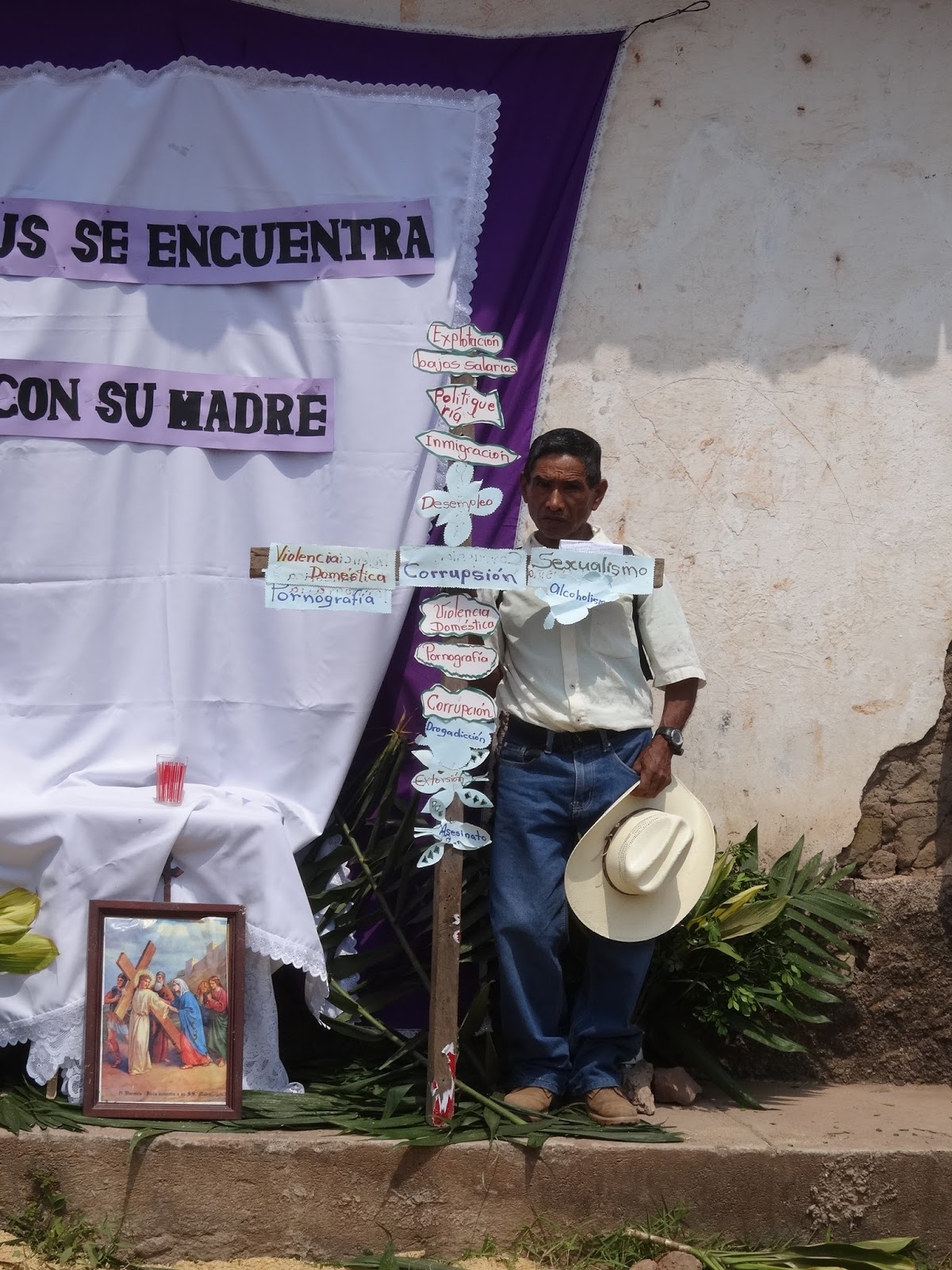In the face of a suffering people it is crucial that the
Church connect their suffering with the suffering of Jesus.
That’s what we did Friday, March 27, in Dulce Nombre,
walking through the town, stopping at fourteen stations, remembering the
traditional Way of the Cross. Several hundred people came from almost all the
villages of the parish.
But the traditional meant remembering the sufferings of the
people, the sins that afflict us here in the parish of Dulce Nombre. But we
recall not just personal sins and occasions of sin, but the sinful social
structure that crucify people and make it difficult for people to live as God’s
children.
Padre German, the pastor, has asked the communities to bring
in crosses with the sins that afflict the community.
Plan Grande had this cross – with sins of indifference to
the poor, alcohol and drugs, attachment to money, violence, robbery,
disintegration of families, lack of love of God.
San Augustín identified these sinful situations on their
cross: adultery, marijuana and cocaine, violence, prostitution, envy, caciquismo (a single boss running
everything).
Montaña Adentro, which has suffered many killings in the
last two years, had a simple written poster with these sins: discouragement in
religious activities, violence, many poor people, lack of drinking water, sale
of alcohol, disobedience of youth in regard to the church.
From Vertientes they denounced many sins: no to drugs and to
alcohol; no to violence – let there be peace in our country; let there be no
corruption on our country; let people be converted and stop doing evil to their
neighbors.
Agua Buena Concepción mentioned only one sin – a major one:
inequality.
La Torera is a small community which is just being
evangelized this year and has 7 young people who will be baptized in the Easter
Vigil. They identified alcohol and weapons of violence.
Dolores had a long list of sins and evils afflicting their
community and the nation on their cross: exploitation, low salaries, politiquería (politicizing everything
and being manipulated by politicians), immigration, unemployment, domestic
violence, pornography, sexualismo,
alcoholism, corruption, extortion, killings.
Other communities had crosses with these and other sins and
evils affecting their lives.
The first Sunday of Lent I had the catechumens identify the
temptations that they faced as young people. The papers they had written
included temptations to drugs, alcohol, smoking, fighting, robbing, belittling
others, angry, money, lying, laziness, and even killing. There were veiled
references to sexual temptations. But they also identified what I would call,
in the traditional Catholic terminology, “occasions of sin”: cell phones,
music, soccer, dances. There were several that identified the eye as an
occasion of sin.
The crosses with these sins and evils and the papers with
the temptations and occasions of sin were burned outside the church at the end
of the stations.
But for me, one of the most moving moments during the Stations was at the twelfth
station: Jesus dies on the cross. There we had people come forward to mentioned
those who had been murdered in the past year or so. Montaña Adentro had more
than five; San Agustín had more than 14; and there were more from about five or
so villages.
The suffering is great. But, as Padre German noted, quoted
the martyred Jesuit Ignacio Ellacuría, “We have to be honest with reality.”
But we tried, as we walked the way of the cross, to recall
the presence of Christ with us in our sufferings and to offer hope. As we
prayed in the last station, “Death is not the final word; there is hope.”
Holy Week is beginning, although the way of the cross is
being lived out daily in the lives of the people in our parish.
I pray that hope may triumph – even in small ways.
But, as a believer in a God who became flesh and suffered
with us, I believe in Life. But the life that I believe in means that we may
suffer but we are called to give ourselves up for others, to seek the good of
all – the Reign of God, in religious terms. In this way we try to live the
Resurrection.
-------------------
As part of our Stations of the Cross, we used this quote from the September 7, 2013 homily of Pope Francis at every station:
"My Christian faith urges me to look to the Cross. How I wish that all men and women of good will would look to the Cross if only for a moment! There, we can see God’s reply: violence is not answered with violence, death is not answered with the language of death. In the silence of the Cross, the uproar of weapons ceases and the language of reconciliation, forgiveness, dialogue, and peace is spoken."
--------------------
The text in Spanish of the Stations that we used can be found here in a PDF file.
More photos of the Stations of the Cross can be viewed here.















No comments:
Post a Comment